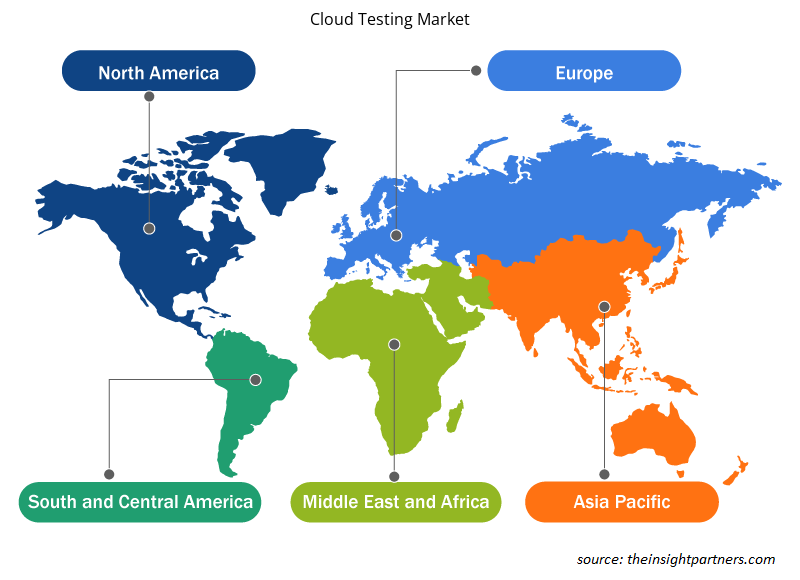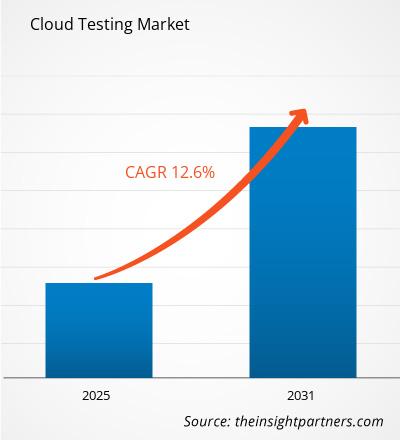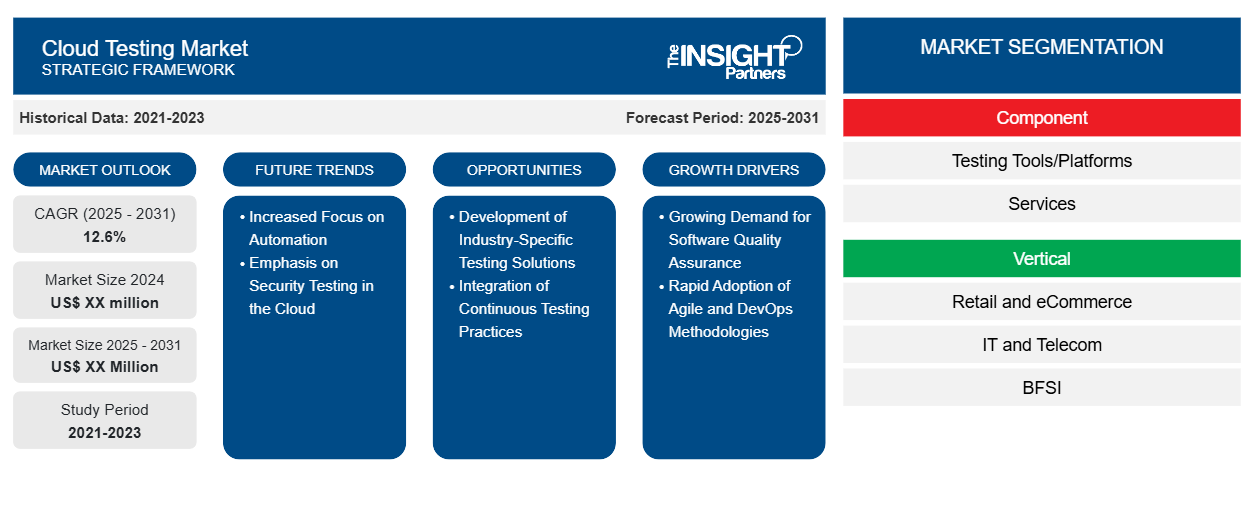من المتوقع أن يسجل سوق اختبار السحابة معدل نمو سنوي مركب بنسبة 12.6٪ من عام 2023 إلى عام 2031، مع توسع حجم السوق من XX مليون دولار أمريكي في عام 2023 إلى XX مليون دولار أمريكي بحلول عام 2031.
تم تقسيم التقرير حسب المكون (أدوات/منصات الاختبار، الخدمات)؛ والقطاع الرأسي (التجزئة والتجارة الإلكترونية، وتكنولوجيا المعلومات والاتصالات، والخدمات المصرفية والمالية والتأمين، ووسائل الإعلام والترفيه، والنقل، وغير ذلك). كما تم تقسيم التحليل العالمي بشكل أكبر على المستوى الإقليمي والدول الرئيسية. ويقدم التقرير القيمة بالدولار الأمريكي للتحليل والقطاعات المذكورة أعلاه
غرض التقرير
يهدف تقرير Cloud Testing Market الصادر عن The Insight Partners إلى وصف المشهد الحالي والنمو المستقبلي وأهم العوامل الدافعة والتحديات والفرص. وسيوفر هذا رؤى لمختلف أصحاب المصلحة في الأعمال التجارية، مثل:
- مزودي/مصنعي التكنولوجيا: لفهم ديناميكيات السوق المتطورة ومعرفة فرص النمو المحتملة، وتمكينهم من اتخاذ قرارات استراتيجية مستنيرة.
- المستثمرون: إجراء تحليل شامل للاتجاهات فيما يتعلق بمعدل نمو السوق، وتوقعات السوق المالية، والفرص المتاحة عبر سلسلة القيمة.
- الهيئات التنظيمية: لتنظيم السياسات ومراقبة الأنشطة في السوق بهدف تقليل الانتهاكات والحفاظ على ثقة المستثمرين ودعم سلامة السوق واستقرارها.
تجزئة سوق اختبار السحابة
عنصر
- أدوات/منصات الاختبار
- خدمات
رَأسِيّ
- التجزئة والتجارة الإلكترونية
- تكنولوجيا المعلومات والاتصالات
- الخدمات المالية والمصرفية والتأمين
- الإعلام والترفيه
- مواصلات
- آحرون
قم بتخصيص هذا التقرير ليناسب متطلباتك
ستحصل على تخصيص لأي تقرير - مجانًا - بما في ذلك أجزاء من هذا التقرير، أو تحليل على مستوى الدولة، وحزمة بيانات Excel، بالإضافة إلى الاستفادة من العروض والخصومات الرائعة للشركات الناشئة والجامعات
- احصل على أهم اتجاهات السوق الرئيسية لهذا التقرير.ستتضمن هذه العينة المجانية تحليلاً للبيانات، بدءًا من اتجاهات السوق وحتى التقديرات والتوقعات.
عوامل نمو سوق اختبار السحابة
- الطلب المتزايد على ضمان جودة البرامج: مع اعتماد الشركات بشكل متزايد على تطبيقات البرامج لتشغيل عملياتها، لم يكن الطلب على البرامج عالية الجودة أكبر من أي وقت مضى. يتيح الاختبار السحابي للمؤسسات إجراء اختبارات مكثفة عبر بيئات ومنصات متنوعة، مما يضمن أداء التطبيقات بشكل مثالي في ظل ظروف مختلفة. إن الحاجة إلى عمليات اختبار فعّالة يمكنها تحديد المشكلات وحلها بسرعة تشكل محركًا مهمًا لسوق الاختبار السحابي، حيث تسعى الشركات إلى تقديم تجارب مستخدم خالية من العيوب والحفاظ على قدرتها التنافسية.
- التبني السريع لمنهجيات Agile وDevOps: إن التحول نحو منهجيات Agile وDevOps يحول مشهد تطوير البرمجيات، ويؤكد على الحاجة إلى الاختبار والتكامل المستمر. تدعم حلول الاختبار السحابي هذه المنهجيات من خلال توفير المرونة وقابلية التوسع اللازمة لإجراء الاختبارات في الوقت الفعلي طوال دورة حياة التطوير. يسمح هذا النهج للفرق بتحديد العيوب في وقت مبكر، وتقليل وقت طرح المنتج في السوق، وتعزيز التعاون بين فرق التطوير والاختبار، مما يجعل الاختبار السحابي مكونًا أساسيًا لممارسات تطوير البرمجيات الحديثة.
الاتجاهات المستقبلية لسوق اختبار السحابة
- التركيز المتزايد على الأتمتة: تُعَد الأتمتة اتجاهًا مهمًا في سوق الاختبارات السحابية، حيث تسعى المؤسسات إلى تبسيط عمليات الاختبار وتحسين الكفاءة. تتيح أدوات الاختبار الآلية التنفيذ السريع لحالات الاختبار، مما يقلل الوقت والجهد المطلوبين للاختبار اليدوي. ويعود هذا الاتجاه إلى الحاجة إلى دورات إصدار أسرع والتعقيد المتزايد للتطبيقات. ومع دمج منصات الاختبار السحابية لمزيد من قدرات الأتمتة، يمكن للمؤسسات تحقيق مستويات أعلى من الدقة والاتساق في جهود الاختبار الخاصة بها.
- التركيز على اختبار الأمان في السحابة: مع انتقال المزيد من المؤسسات إلى التطبيقات المستندة إلى السحابة، أصبحت الحاجة إلى اختبارات أمان قوية أمرًا بالغ الأهمية. وقد أدى التكرار المتزايد للتهديدات السيبرانية وانتهاكات البيانات إلى زيادة التركيز على التحقق من صحة الجوانب الأمنية للتطبيقات المنشورة في بيئات السحابة. تتطور حلول اختبار السحابة لتشمل قدرات اختبار أمان شاملة، مثل تقييمات الثغرات الأمنية واختبار الاختراق، مما يضمن بقاء التطبيقات آمنة ومتوافقة مع لوائح الصناعة. يعكس هذا الاتجاه الاعتراف المتزايد بالأمان كمكون أساسي لدورة حياة تطوير البرمجيات.
فرص سوق اختبار السحابة
- تطوير حلول اختبار خاصة بالصناعة: هناك فرصة متزايدة لمقدمي خدمات الاختبار السحابي لتطوير حلول خاصة بالصناعة ومصممة خصيصًا لتلبية المتطلبات الفريدة لمختلف القطاعات، مثل الرعاية الصحية، والتمويل، والتجارة الإلكترونية. ومن خلال فهم التحديات والاحتياجات التنظيمية الخاصة بهذه الصناعات، يمكن لمقدمي الخدمات إنشاء حلول اختبار مخصصة تعمل على تعزيز الامتثال والأمان والأداء. ولا يساعد هذا النهج المركّز البائعين على تمييز أنفسهم في سوق تنافسية فحسب، بل يضعهم أيضًا في مكانة الشركاء الموثوق بهم للمؤسسات التي تسعى إلى خدمات اختبار سحابية متخصصة.
- دمج ممارسات الاختبار المستمر: مع استمرار المؤسسات في تبني منهجيات DevOps وAgile، يمثل دمج ممارسات الاختبار المستمر فرصة كبيرة لمقدمي خدمات الاختبار السحابي. من خلال تقديم حلول تدعم خطوط أنابيب التكامل المستمر والنشر المستمر (CI/CD)، يمكن للموردين مساعدة المؤسسات في تسريع عمليات التطوير الخاصة بها مع ضمان تسليم برامج عالية الجودة. تتيح هذه الفرصة لمقدمي الخدمات وضع حلول الاختبار السحابي الخاصة بهم كأدوات أساسية تمكن الشركات من الابتكار بشكل أسرع والاستجابة لتغيرات السوق والحفاظ على ميزة تنافسية في صناعاتهم المعنية.
رؤى إقليمية حول سوق اختبار السحابة
لقد قام المحللون في Insight Partners بشرح الاتجاهات والعوامل الإقليمية المؤثرة على سوق اختبار السحابة طوال فترة التنبؤ بشكل شامل. يناقش هذا القسم أيضًا قطاعات سوق اختبار السحابة والجغرافيا في جميع أنحاء أمريكا الشمالية وأوروبا ومنطقة آسيا والمحيط الهادئ والشرق الأوسط وأفريقيا وأمريكا الجنوبية والوسطى.

- احصل على البيانات الإقليمية المحددة لسوق اختبار السحابة
نطاق تقرير سوق اختبار السحابة
| سمة التقرير | تفاصيل |
|---|---|
| حجم السوق في عام 2023 | XX مليون دولار أمريكي |
| حجم السوق بحلول عام 2031 | XX مليون دولار أمريكي |
| معدل النمو السنوي المركب العالمي (2023 - 2031) | 12.6% |
| البيانات التاريخية | 2021-2022 |
| فترة التنبؤ | 2024-2031 |
| القطاعات المغطاة | حسب المكون
|
| المناطق والدول المغطاة | أمريكا الشمالية
|
| قادة السوق وملفات تعريف الشركات الرئيسية |
|
كثافة اللاعبين في سوق اختبار السحابة: فهم تأثيرها على ديناميكيات الأعمال
يشهد سوق اختبار السحابة نموًا سريعًا، مدفوعًا بالطلب المتزايد من المستخدم النهائي بسبب عوامل مثل تفضيلات المستهلكين المتطورة والتقدم التكنولوجي والوعي المتزايد بفوائد المنتج. ومع ارتفاع الطلب، تعمل الشركات على توسيع عروضها والابتكار لتلبية احتياجات المستهلكين والاستفادة من الاتجاهات الناشئة، مما يؤدي إلى زيادة نمو السوق.
تشير كثافة اللاعبين في السوق إلى توزيع الشركات أو المؤسسات العاملة في سوق أو صناعة معينة. وهي تشير إلى عدد المنافسين (اللاعبين في السوق) الموجودين في مساحة سوق معينة نسبة إلى حجمها أو قيمتها السوقية الإجمالية.
الشركات الرئيسية العاملة في سوق اختبار السحابة هي:
- آي بي إم
- كابجيميني
- شركة كافيسون سيستمز
- تقنيات سيجنيتي
- مدرك
- سيجنت انفوتيك
إخلاء المسؤولية : الشركات المذكورة أعلاه ليست مرتبة بأي ترتيب معين.

- احصل على نظرة عامة على أهم اللاعبين الرئيسيين في سوق اختبار السحابة
نقاط البيع الرئيسية
- التغطية الشاملة: يغطي التقرير بشكل شامل تحليل المنتجات والخدمات والأنواع والمستخدمين النهائيين لسوق اختبار السحابة، مما يوفر صورة شاملة.
- تحليل الخبراء: تم تجميع التقرير على أساس الفهم العميق لخبراء الصناعة والمحللين.
- معلومات محدثة: يضمن التقرير أهمية الأعمال التجارية بسبب تغطيته للمعلومات الحديثة واتجاهات البيانات.
- خيارات التخصيص: يمكن تخصيص هذا التقرير لتلبية متطلبات العملاء المحددة وبما يتناسب مع استراتيجيات العمل بشكل مناسب.
وبالتالي، يمكن أن يساعد تقرير البحث حول سوق اختبار السحابة في تمهيد الطريق لفك شفرة وفهم سيناريو الصناعة وآفاق النمو. ورغم وجود بعض المخاوف المشروعة، فإن الفوائد الإجمالية لهذا التقرير تميل إلى التفوق على العيوب.
- التحليل التاريخي (سنتان)، سنة الأساس، التوقعات (7 سنوات) مع معدل النمو السنوي المركب
- تحليل PEST و SWOT
- حجم السوق والقيمة / الحجم - عالمي، إقليمي، بلد
- الصناعة والمنافسة
- مجموعة بيانات إكسل
التقارير الحديثة
تقارير ذات صلة
شهادات العملاء
سبب الشراء
- اتخاذ قرارات مدروسة
- فهم ديناميكيات السوق
- تحليل المنافسة
- رؤى العملاء
- توقعات السوق
- تخفيف المخاطر
- التخطيط الاستراتيجي
- مبررات الاستثمار
- تحديد الأسواق الناشئة
- تحسين استراتيجيات التسويق
- تعزيز الكفاءة التشغيلية
- مواكبة التوجهات التنظيمية





















 احصل على عينة مجانية ل - سوق اختبار السحابة
احصل على عينة مجانية ل - سوق اختبار السحابة